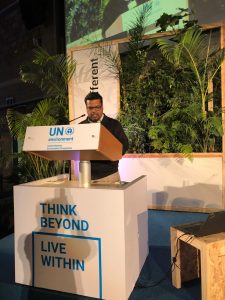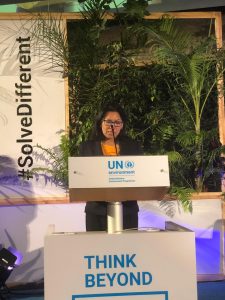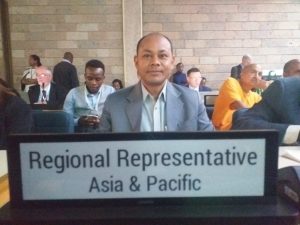Statement of the Farmers Major Group at the fourth session of the United Nations Environment Assembly
Delivered by Mr. Wali Haider
FARMER MAJOR GROUP STATEMENT AT UNEA-4
Thank you chair.
Honorable excellences, distinguished delegates and colleagues:
I am Wali Haider from Roots for Equity, Pakistan and I’m speaking on behalf of the Farmers Major Group.
The dominant paradigm of unsustainable consumption and production continue to devastate and worsen the situation of the environment and the people along with promotion of Trade-Related Aspects of Intellectual Property Rights which force GMOs and commodification of seeds and water. This crisis is further compounded by unabted land grabs by the transnational corporations. This is manifest in the crises in food, climate, environmental degradation, reduced biodiversity, depleted natural resources, and increasing violation of people’s rights and exacerbating inequality.
The industrial model of agricultural production and perverse subsidies in the agricultural sector are destroying the sources of livelihoods of small-scale food producers and their communities, resulting in hunger and forced migration.
To tackle the challenges we are facing in nourishing a growing global population and ensuring food sovereignty require innovations. People-centred and community solutions are innovations and appropriate technologies that protect the environment, promote sustainability, community ownership, social solidarity and mutuality and based on development justice. Innovative solutions that make a difference in people’s lives are often not technological but social innovations, linked with traditional practices and based on indigenous and local knowledge systems. Dimensions of environment, economy and society, the three pillars of sustainable development, are all taken into account in people’s solutions and community innovations towards sustainable consumption and production.
It is proven that in food production, agroecology as a practice based on constant innovation of farmers, a science and a social movement, is known to improve soils, protect health and the environment, improve livelihoods, and increase household income. Agroecology also harnesses traditional and indigenous knowledge systems supported by people’s science and builds community unity.
Therefore, we call for the strengthening and promotion of agro-ecology through appropriate laws, policy and programs as well as the protection of local, indigenous and traditional knowledge in agriculture, and create markets for traditional and heirloom produce. Subsidies, incentives and development aid should be re-targeted away from industrial agriculture, towards agro-ecological solutions and small-scale, local production.
We also call for action to be taken on the following:
- Policies in national and regional level supporting local and community innovations can be strategic, as such in governance of natural resources and community-based resource development. Participatory and community action researches on the issues surrounding sustainable consumption and production will provide evidence-based solutions and should be supported.
- Assert and protect public control over natural resources and prioritize cultivation of nutritious food for local consumption.
- Provide an enabling policy environment for farmers including land to the landless, genuine agrarian reform, access to productive resources including seeds, participation in policy-making and policy coherence at the national and international levels.
- Advance good governance with increased accountability and transparency, removing all anti-people policies to protect natural resources.
- Member states should mainstream biodiversity protection and enhancement across sectors and engage indigenous people and ensure the protection of their rights to land, resources, establish accountability mechanism to ensure compliance to human rights, social and environmental safeguards.
- Call on member states to actively participate in the intergovernmental working group on the elaboration of legally-binding treaty on TNCs and other businesses with respect to human rights.
- Recognition and promotion of the role of women in providing innovative solutions to environmental problems and SCP.
- Ensure participation of civil society, grassroots movements and other stakeholders in assessing new and emerging technologies as a
key component of environmental governance. Due importance should be given to capturing the interpretation of evidences by different actors and enabling broad participation in societal deliberation on technologies. - Provide mechanisms for equitable, effective and inclusive participation of civil society based on recognition of existing inequalities and the need to level the playing field.
We also note with concern that the negotiations are tilted more in the favour of big business than ecology and farmers. However, we call on member states to protect the interest of the small and landless farmers. The farmers of the world stand ready to support you so we can work together on these.
Thank you.
Statement of the Farmers Major Group at the fourth session of the United Nations Environment Assembly
Delivered by Mrs. Sarojeni Rengam
Closing statement from Farmers Major Group
Dear Excellences, Delegates and colleagues:
I am Sarojeni V. Rengan from Pesticide Action Network Asia and the Pacific (PAN AP), representing Farmer Major Group.
Farmer’s Major Group welcomes the resolution on Promoting sustainable practices and innovative solutions for curbing food loss and waste and Chemicals and Waste. As farmers constituency, we hope for its implementation by member states to substantially reduce food loss and wastage.
However, we are concerned that food loses are not being addressed in the industrialized and rich countries. Priority should be given to preventing food losses and wastage at retail and at the end of the consumers and to put a stronger emphasis to food safety and nutrition. Safe and nutritious food is an inseparable element of sustainable food systems and must receive appropriate attention in the present resolution. Food losses at the level of production due to extreme climate events, privatization and monopoly over seeds needs to be strongly emphasized. Meat consumption and production is inextricably linked with and adversely affects of the sustainability of food systems; substantial reduction in production and consumption of meat would be necessary to address better food losses and wastage.
We would like to suggest an enhanced food production system rooted in agro-ecology and climate resilient variants and traditional knowledge would address the issue from food production. In developing countries we have countless examples of PPP aimed at enhanced agricultural infrastructure working against the farmers by increasing costs and reduced incomes, therefore, it is critical that there is substantial public investment in post harvest services as well.
Regarding the Resolution on Chemicals and Waste, the farmers major groups, welcomes the need for urgent and resolute action at all levels to implement the 2030 Agenda and including an improved enabling framework for the sound management of chemicals and waste and welcomes the initiative of the High Ambition Alliance on Chemicals and Waste.
We call for urgent actions to implement and immediately address the thousands of farmers and agricultural workers poisoned by pesticides and children unknowingly suffer the adverse health effects and lowered IQ as a result of exposure to chemicals particularly pesticides.
In addition, it would be urgent that legally binding instruments are developed to stop the health and environmental impacts of the use and dumping of highly hazardous pesticides in developing countries as well as hazardous chemicals.
We would also like to suggest the inclusion of groups that are most affected by these chemicals and waste and CSOs in this High Ambition alliance so that their concerns are addressed.
We also note with concern that the negotiations are tilted more in the favour of big business than ecology and farmers. However, we call on member states to protect the interest of the small and landless farmers. The farmers of the world stand ready to support you so we can work together on these.
Thank you!
Closing Common Statement of all Major Groups except Business & Industry
15 March 2019, UNEA, Nairobi
Thank you Chair for this opportunity to speak. Distinguished delegates, ladies and gentlemen.
My name is Prem Singh Tharu, an Indigenous person from Asia indigenous Peoples Pact (AIPP) representing Asia Region from Nepal and I am honoured speaking today on behalf of the Major Groups & Stakeholders, except Business & Industry.
We join in the condolences to the New Zealand.
It is really a pity that this UNEA did not reach its potential, despite an active and committed Presidency. Resolutions on vital issues such as deforestation and agricultural supply chains and strengthening of geoengineering governance at the UN, dropped entirely, and others diluted. Lack of concerted action on, and resources for, implementation means certain failure to address the critical issues despite the fact that the new GEO6 report indicates that, we are going – with increased momentum – towards irreversible decline.
In an era that is sometimes called “post-truth,” the science-policy interface and assessments are more crucial than ever. We support the growth of citizen science.
We intend to enhance engagement of the Major Groups in the Work Programmes with inclusion and respect of indigenous traditional knowledge and practices.
On SCP we did not see much progress than what was already agreed in the One Planet Network, but we are looking forward to the promised report comprising the International Resource Panel, to provide insights on the management of natural resources and raw materials in relation to the 2030 Agenda for Sustainable development.
We regret the lack of recognition of the role of environmental human rights defenders in the resolution on gender equality.
Even if the resolution on geoengineering dropped off the table, we have great concern over its severe risk for the future of people and planet.
We will continue to build on the work we have done collectively in the past two years towards allowing a global governance framework to address urgency of plastic pollution. Despite the disappointment, we will keep working with all government and stakeholders who want a better world for our children, not just for corporate interests.
While we welcome the resolutions on food and waste, there are gaps in dealing with production and consumption. Priority has to be placed on agroecology based on local knowledge, biodiversity, animal welfare, climate resilience varieties, local seeds and knowledge.
In addition, the resolution on chemicals and waste supports a High Ambition Alliance but we suggest the inclusion of groups that are most affected by these chemicals and waste and CSOs in this alliance so that their concerns are fully addressed.
If we don’t commit and take actions to halt deforestation and forest degradation today, we will not be able to ensure food security. Healthy ecosystems are the basis for sustainable agriculture. We therefore appeal to all delegates in the room to step up and take urgent actions to halt deforestation and forest degradation.
For the next UNEA, we would like to see a strong, coherent theme which provides the opportunity to work on the systemic issues and drivers of the environmental crisis. At Stockholm+50 we should be ready to present a Planetary Boundaries Framework, including actions to use earth systems approaches to implement and monitor preventative, transformative and restorative actions. Together with a monitoring scheme of progress made, so we can hold governments accountable for what they do.
Thank you for your attention.

